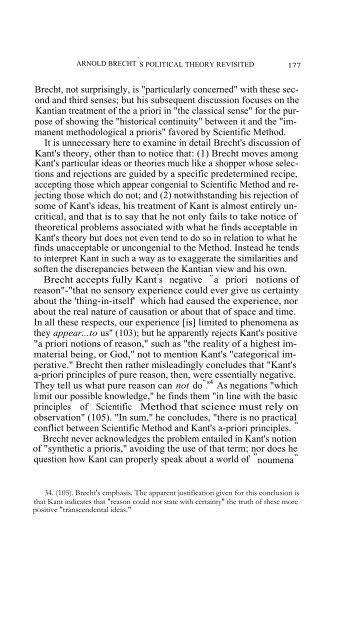ARNOLD BRECHT'S POLITICAL THEORY REVISITED Political ...
ARNOLD BRECHT'S POLITICAL THEORY REVISITED Political ...
ARNOLD BRECHT'S POLITICAL THEORY REVISITED Political ...
You also want an ePaper? Increase the reach of your titles
YUMPU automatically turns print PDFs into web optimized ePapers that Google loves.
<strong>ARNOLD</strong> BRECHT ' S <strong>POLITICAL</strong> <strong>THEORY</strong> <strong>REVISITED</strong> 177<br />
Brecht, not surprisingly, is "particularly concerned" with these second<br />
and third senses; but his subsequent discussion focuses on the<br />
Kantian treatment of the a priori in "the classical sense" for the purpose<br />
of showing the "historical continuity" between it and the "immanent<br />
methodological a prioris" favored by Scientific Method.<br />
It is unnecessary here to examine in detail Brecht's discussion of<br />
Kant's theory, other than to notice that: (1) Brecht moves among<br />
Kant's particular ideas or theories much like a shopper whose selections<br />
and rejections are guided by a specific predetermined recipe,<br />
accepting those which appear congenial to Scientific Method and rejecting<br />
those which do not; and (2) notwithstanding his rejection of<br />
some of Kant's ideas, his treatment of Kant is almost entirely uncritical,<br />
and that is to say that he not only fails to take notice of<br />
theoretical problems associated with what he finds acceptable in<br />
Kant's theory but does not even tend to do so in relation to what he<br />
finds unacceptable or uncongenial to the Method. Instead he tends<br />
to interpret Kant in such a way as to exaggerate the similarities and<br />
soften the discrepancies between the Kantian view and his own.<br />
Brecht accepts fully Kant ' s negative " a priori notions of<br />
reason"-"that no sensory experience could ever give us certainty<br />
about the 'thing-in-itself' which had caused the experience, nor<br />
about the real nature of causation or about that of space and time.<br />
In all these respects, our experience [is] limited to phenomena as<br />
they appear...to us" (103); but he apparently rejects Kant's positive<br />
"a priori notions of reason," such as "the reality of a highest immaterial<br />
being, or God," not to mention Kant's "categorical imperative."<br />
Brecht then rather misleadingly concludes that "Kant's<br />
a-priori principles of pure reason, then, were essentially negative.<br />
They tell us what pure reason can not do " . s4 As negations "which<br />
limit our possible knowledge," he finds them "in line with the basic<br />
principles of Scientific Method that science must rely on<br />
observation" (105). "In sum," he concludes, "there is no practical<br />
conflict between Scientific Method and Kant's a-priori principles. "<br />
Brecht never acknowledges the problem entailed in Kant's notion<br />
of "synthetic a prioris," avoiding the use of that term; nor does he<br />
question how Kant can properly speak about a world of " noumena "<br />
34. (105). Brecht's emphasis. The apparent justification given for this conclusion is<br />
that Kant indicates that "reason could not state with certainty" the truth of these more<br />
positive "transcendental ideas."
















